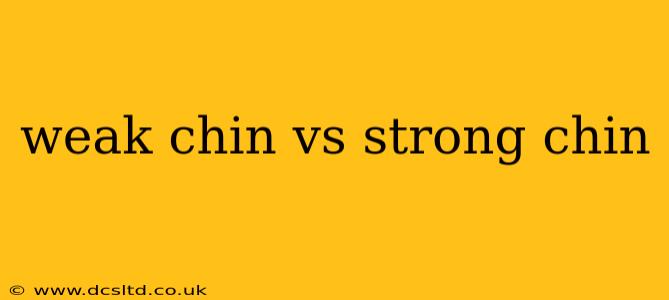Facial structure plays a significant role in overall aesthetics, and the chin is a key feature influencing the perception of balance and harmony. This guide explores the differences between a weak chin and a strong chin, addressing common questions and concerns.
What is a Weak Chin?
A weak chin, also known as a receding chin or microgenia, is characterized by a chin that appears underdeveloped or set back in comparison to the rest of the facial features. It may lack projection, appearing small or even slightly concave. This can lead to a perceived imbalance in the facial profile, potentially impacting overall facial harmony. The degree of weakness can vary greatly from person to person.
What is a Strong Chin?
A strong chin, conversely, projects prominently forward, creating a well-defined jawline and a balanced facial profile. It's typically characterized by a square or slightly pointed shape and contributes to a more masculine or assertive appearance, though it can be aesthetically pleasing on both men and women. The strength of a chin is relative to other facial features; what constitutes a "strong" chin differs depending on the individual's overall facial structure.
How is Chin Strength Determined?
The strength of one's chin is a subjective assessment, often influenced by personal preferences and cultural ideals. However, several objective factors contribute to its perceived strength:
- Projection: The extent to which the chin protrudes forward from the face. A more pronounced projection generally suggests a stronger chin.
- Size and Shape: A larger, more defined chin, whether square, round, or pointed, tends to be perceived as stronger than a smaller, less defined one.
- Relationship to Other Facial Features: The chin's strength is also judged in relation to the rest of the face. A proportionally larger chin may appear stronger even if its absolute projection is moderate.
What Causes a Weak Chin?
A weak chin can be attributed to several factors, including:
- Genetics: Heredity plays a significant role in determining facial structure, including chin development.
- Hormonal imbalances: Hormonal fluctuations during puberty can influence bone growth, potentially leading to an underdeveloped chin.
- Underlying medical conditions: In rare cases, certain medical conditions can affect facial development and contribute to a weak chin.
Can a Weak Chin Be Improved?
Yes, several options exist to improve the appearance of a weak chin:
- Dermal Fillers: These temporary injectable fillers can add volume to the chin, creating a more projected appearance.
- Chin Implants: This surgical procedure involves inserting a permanent implant to enhance chin projection.
- Jaw Surgery (Orthognathic Surgery): For more severe cases of microgenia, this complex surgery can reposition the jawbone to improve the overall facial structure.
It's crucial to consult a qualified plastic surgeon or maxillofacial surgeon to determine the most suitable option based on individual needs and preferences.
What are the Aesthetic Implications of a Strong vs. Weak Chin?
The perception of chin strength significantly impacts overall facial aesthetics. A strong chin contributes to:
- Facial Balance and Harmony: A well-projected chin often creates a more balanced and harmonious facial profile.
- Enhanced Jawline Definition: It contributes to a more defined jawline, which is often considered aesthetically pleasing.
- Stronger and More Assertive Appearance: A strong chin can create an impression of strength, confidence, and assertiveness.
Conversely, a weak chin can:
- Create an Imbalance in the Facial Profile: This imbalance can sometimes lead to a perceived lack of facial harmony.
- Less Defined Jawline: The jawline may appear less defined, leading to a softer or less structured appearance.
Are there any health concerns associated with a weak chin?
While a weak chin is primarily an aesthetic concern, in some cases, severe microgenia can be associated with difficulty chewing, swallowing, or breathing. However, this is typically only observed in cases of significantly underdeveloped jaw structures.
How Can I Determine if I Have a Weak or Strong Chin?
Self-assessment can be misleading. For a more objective evaluation, consider consulting a plastic surgeon or maxillofacial surgeon. They can assess your facial structure and discuss potential options for improvement.
This guide provides a general overview of weak and strong chins. Remember that beauty standards are subjective and diverse, and chin strength is only one aspect of overall facial aesthetics. Individual preferences vary greatly, and what one person considers a "strong" or "weak" chin may differ from another's opinion.
